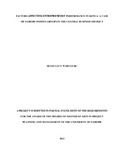| dc.description.abstract | The overall objective of this research was to investigate the challenges of implementation of
Diesel thermal Power Plant Projects. The objectives of the research were to identify the technical
challenges on implementation, establish political and legal constraints, determine financial
challenges and identify human resource challenges affecting implementation of diesel power
plant projects. Through literature review, it was shown that power projects face challenges like
human resource, technical challenges, financing challenges, health safety and environmental
challenges as well as political challenges. Data was collected through observation,
questionnaires, interviews and document analysis. The researcher targeted 601 individuals who
worked on the project as employees of the Contractor, subcontractors and KenGen staff.. The
project was executed with over 601 personnel from Wartsila and KenGen, subcontractors who
included Civicon limited, Central Electrical Ltd, Mulji Devril Ltd, KK Security Services and
SKM consultants. Health, safety and environmental issues were addressed though one person
died during the platform civil works by Mulji Devril Ltd. KenGen funded the project from funds
raised from the public infrastructure bond. Overall the project was successfully executed with
the power plant generating up to 119 MW of electricity with auxiliary consumption of 2.1 MW
and exporting up to 117 MW of electricity after 15 months of construction and commissioning.
The project experienced challenges but were addressed effectively leading to project successful
execution. Challenges encountered included the need to carry out environmental impact
assessment, project delays due to accidents including death of a worker during the project
platform. The project used over 601 people directly working on the project but most of them
were employees of subcontractors. The project delayed by three months but was however
technically successful in generating the desired power. Due to lack of capacity to run the power
plant, KenGen decided to subcontract the power plant to a third party for operation and
maintenance. It is recommended that companies should explore various funding opportunities to
identify cost effective long term financing for power plant projects while companies should be
strategic in human resource planning and development so that their growth plans and human
resource plans are in harmony to avoid cases where projects are commissioned and the
companies have no capacity to operate and maintain them. The project made use of modular
construction which significantly reduced the overall cost and time of implementing the project, a
technique that project executors should adopt where possible to manage project cost and time. | en |

